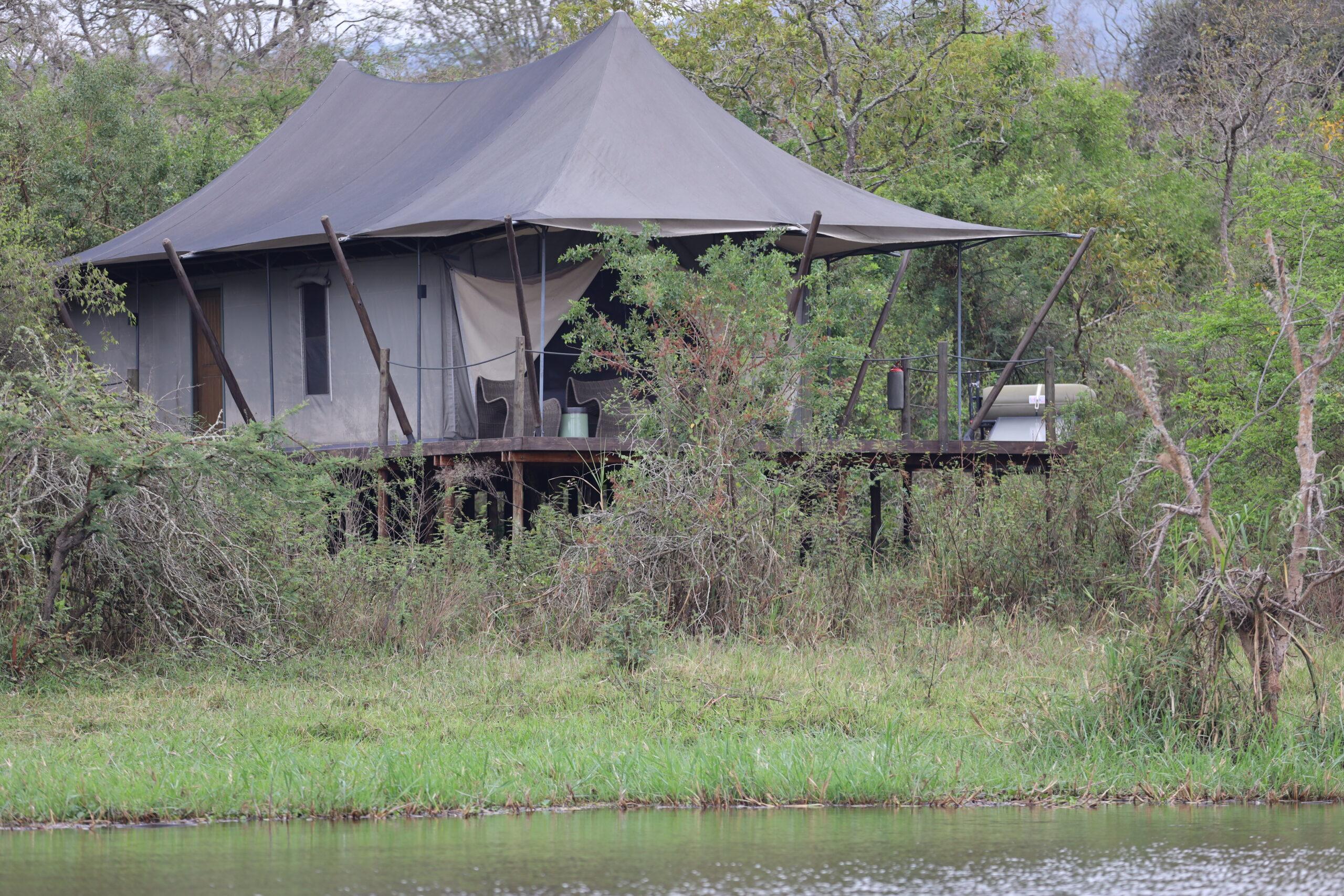Magashi Camp is a part of Wilderness, a company with over 40 camps in seven countries that exist to protect wilderness areas and the fauna and flora they support. Magashi Camp is strongly rooted in a core purpose: To help contribute towards the conservation and sustainable operation of Rwanda’s last protected savannah ecosystem, and to drive sustainable ecotourism in the wildlife-rich Akagera National Park.
Located in North Eastern Rwanda, at the country’s border with Tanzania, is Akagera National Park. Magashi is nestled in the North Eastern corner of Akagera National Park overlooking the beautiful Lake Rwanyakazinga. This area is one of the most scenic savannahs in East Africa I have ever seen. Open plains transition into grassy low mountains and woodlands before rising into colourful mountains of greens, deep ochre and reds. Lakes break the horizon, surrounded by swampy marshlands thick with papyrus.
On Safari

The camp is the only exclusive-use area in Akagera, which means guests are the only ones who will be on game drives and wildlife viewing activities in the area. There is an abundance of plains game and a healthy population of lions, which were re-introduced into the park in 2015 after a 20-year absence. Black rhinos were also re-introduced in 2017, with more added to the population in recent years. Other animal sightings can include white rhinos, leopards, elephants, buffalos and antelope species including elands and topi. There are also Maasai giraffes, monkeys, savannah birds, civets, hyenas, as well as serval cats.
Taking to Lake Ihema by boat is an activity offered at Magashi Camp and one not to be missed. Lake Ihema has got one of the largest concentrations of hippos in East Africa and there are many crocodiles that you will find along the shores of the lake. Water birds can be seen on a boating safari on Lake Ihema as well as a stunning sunset over the lake.
As can be expected with the high standard of Wilderness, my safari experience was enhanced by the knowledge and professionalism of my guide and the staff in the camp which made me instantly feel at home. Add to that the little extras like a bush breakfast and sundowner drinks on a boat cruise of the lake and they really do think of everything.
Camp experience

With just six airy tents tucked away in the bush with uninterrupted views over Lake Rwanyakazinga, you get a sense of remoteness. Magashi’s main area comprises a luxurious lounge, dining and bar area, pool, and expansive viewing deck with a fire pit.
It is the way this camp is integrated into its surroundings that makes it so special. Influences of Rwandan culture are balanced with the wilderness that surrounds them. There are no fences, so the wildlife is uninterrupted, making their home a shared space with the camp.
Intimacy is paramount at Magashi with the six glamping tents spread out far enough away that you can hardly see your neighbour, and all linked with a raised boardwalk. Stepping inside the tent, the architecture and interiors pay homage to traditional Rwandan culture. Every little luxury has been carefully planned to maximise sustainability. An oversized bed sits in the centre of the tent with comfortable seating at the base a perfect spot to sit inside yet still gaze out over the water. There is ample storage space and room to move in the tent. At night, you can have the walls zipped down or left up with the mosquito netting the only thing separating you from the surrounding bush.
The dining experience

A stay at Magashi Camp is all-inclusive of meals and drinks. A light snack and coffee are served early in the morning before your first game drive. Snacks are enjoyed while out in the bush before returning to a delicious lunch served on the deck overlooking the lake. Afternoon tea is served just before the afternoon and evening game drive. If you are lucky, while the sun sets you will stop for sundowner drinks and snacks before continuing with the evening game drive. On returning to the lodge, and wondrous dinner is served and you can continue to enjoy drinks into the night around the boma.
Overall experience

Wilderness also provides monitoring support to Akagera’s rhino reintroduction project, which saw a new supplementary population being returned to the park in 2021. They also continue to support AMC’s lion research through the sponsorship of satellite collars and regular monitoring.
Like all other Wilderness Safaris camps, Magashi is driven by the company’s 4Cs sustainability ethos of Commerce, Community, Culture and Conservation. With barely any tourism background, one out of three employees of the camp staff was sourced directly from the neighbouring communities. The company continues to hire more local people as it trains and develops its current staff into senior positions, and has also been sourcing local products and handcrafted gifts through community projects.






